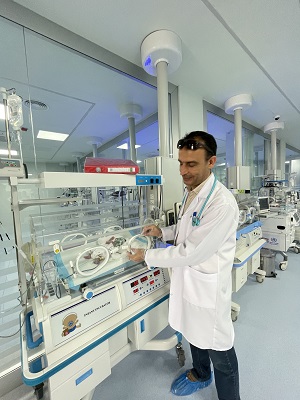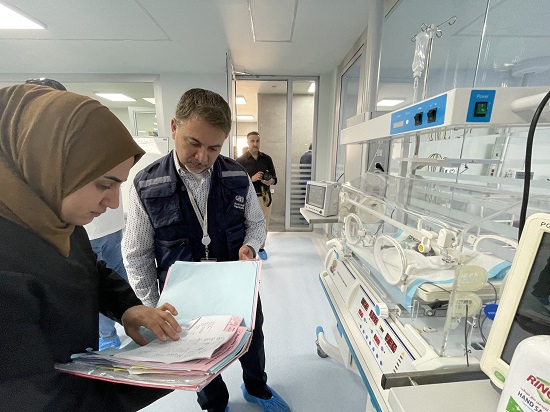 A premature baby at the WHO-supported NICU in Erbil Maternity Teaching Hospital, Erbil, Kurdistan region of IraqErbil on 24 May 2023: “I wish I had a name, but I don’t have one yet. I still carry my mother’s name so you can call me ‘son of Nisreen’ as written on the bracelet they put on my tiny wrist.
A premature baby at the WHO-supported NICU in Erbil Maternity Teaching Hospital, Erbil, Kurdistan region of IraqErbil on 24 May 2023: “I wish I had a name, but I don’t have one yet. I still carry my mother’s name so you can call me ‘son of Nisreen’ as written on the bracelet they put on my tiny wrist.
I was born on 8 April 2023 – 9 weeks before my birth due date – weighing 800 grams. Yes, just 800 grams! Previously premature babies like me with this low birth weight would not have made it this far but, apparently, I am lucky. I am lucky to be born in a hospital newly rehabilitated and equipped with the latest medical technologies to give the gift of life to little human beings like me.
I spent my first 50 days of life in this small transparent box called ‘incubator’. I sleep in it; I eat in it; and I so far spent all my days enjoying its warmth. Yes, I am lucky and my start in life might look difficult, but my days are not in danger anymore.
Every day, people dressed in gowns and white coats come to check on me, some tickle me with their rubber gloves. Yesterday, a nurse even gave me a painful injection. I wanted to cry, but I could not!.. but for the last few days, I see the smiles on the faces of the doctors every time they peek through the glass of my box. Their smiles give me comfort and I feel that my life out of this box is not far. I cannot wait to meet my family and finally have a name.
I know my mother Nisreen and my father Karwan are eagerly waiting to introduce me to my sister and the rest of the family. They did not think I would make it this far, but things are looking rather promising.
My story would have been a normal one if I was born on my due date in any maternity hospital in my town but coming to life too early and too tiny put me at a risk that only a well-equipped maternity hospital could manage. I am so happy to be born in Erbil Maternity Teaching Hospital which has today the right equipment and the right doctors and nurses to care for small people like me.”
WHO team was inspired by the story of little Meer, and during the visit to the hospital, were told that Meer is now weighing 1800 grams and is getting ready to leave the incubator in the aforementioned hospital and go meet his family. His days are no longer in danger after spending almost two months under the care of well-trained healthcare professionals in a WHO-supported facility. Meer and premature babies like him had little chances of survival before the opening of this state-of-the-art neonatal service in Erbil.
The journey of Meer is a proof of the impact of investing in quality health care for premature infants. This is the reason why WHO and the U.S Department of State Bureau of Population, Refugees, and Migration have partnered with Erbil Directorate of Health and Erbil Maternity Teaching Hospital to upgrade the neonatal services as well as the delivery room with outstanding impact on maternal and child survival and well-being. The second tranche of the project will further improve the obstetric services and will provide Meer and other premature babies from Erbil and surrounding governorates with a healthy start in life.
 WHO visits the renovated and expanded neonatal intensive care unit at Erbil Maternity Teaching Hospital, which was funded by the United States Bureau of Population, Refugees, and Migration
WHO visits the renovated and expanded neonatal intensive care unit at Erbil Maternity Teaching Hospital, which was funded by the United States Bureau of Population, Refugees, and Migration








